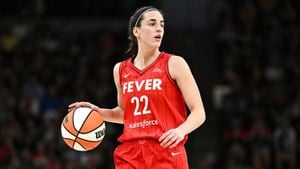Wicked, the beloved musical adaptation of Gregory Maguire’s novel, has finally made its way to the big screen, and it’s been the topic of much anticipation and excitement. With the film officially released on November 22, 2024, audiences sit on the edge of their seats, buzzing with enthusiasm as reviews pour in from critics and fans alike.
The film adaptation of Wicked, directed by Jon M. Chu, has proven more than just a faithful retelling of the stage show. Critics are praising it as 'the best movie musical in years,' heralded for its stellar performances and vibrant visuals, leaving behind the proverbial trap of celebrity casts overshadowing compelling storytelling.
Starring Cynthia Erivo and Ariana Grande as Elphaba and Glinda, respectively, much was at stake. The weight of expectations and hype had been building up since both actresses were prominently featured during the Summer Olympics marketing blitz. One might have wondered if the film could actually live up to such lofty standards. According to critics, it certainly does, and perhaps even exceeds them.
From the opening chords of the film, audiences are plunged directly back to the iconic world of Oz, starting with the captivating number "No One Mourns the Wicked," which sets the atmosphere of intrigue and drama. The genuine emotional connection between Erivo as Elphaba and Grande as Glinda wants to resonate through the screen. Their chemistry is palpable, and the performances are rich, thanks in part to live singing during filming—a refreshing departure from less authentic sounding musicals.
The relationship between the two witches serves as the heart of the narrative, showing their transformation from mere acquaintances to friends bonded through the hurdles they face at Shiz University. The film manages to dig deep, allowing viewers to explore Elphaba’s struggles of being different and the societal pressures faced by both women. Critics have noted how Erivo’s portrayal of Elphaba is beautifully layered, showcasing her initial restraint and vulnerability before soaring to breathtaking emotional heights.
While the length of the film—clocking in at two hours and 40 minutes—initially raised eyebrows, many reviewers have pointed out how director Chu has used the runtime wisely to explore character development, allowing the audience to invest more deeply in the solid foundation of the story.
But what’s truly captivating is the artistry of the spectacle. Cinematographer and the visual design team have turned the stage’s vibrant palette and inventive choreography principles of the stage musical—traditionally constrained to theaters—into grand cinematic moments full of texture and depth. Each musical number feels like its own delightful entity, capturing the charm and magic of the Broadway experience, with stunning choreography on full display. For viewers who’ve seen the stage adaptations, the uplifting feeling of their favorite Broadway moments is preserved and amplified.
Yet, not everything was met with rave reviews. The performances of some key supporting characters, such as the Wizard played by Jeff Goldblum and Madame Morrible embodied by Michelle Yeoh, left critics split. Some found their roles lackluster, potentially overshadowed by the formidable lead pairing of Erivo and Grande. A frequent sentiment was disappointment: how can such talented actors offer performances hampered by underdevelopment within the script?
The film also embraces the political allegories presented both within the original musical and Maguire’s novel, showcasing themes of identity, acceptance, and challenging authority. While the political commentary is certain to resonate with many, the film seems cautious, taking the middle road to avoid alienation of parts of its audience.
Another hallmark of the movie adaptation is its memorable soundtrack, co-created by composer Stephen Schwartz. While many numbers mirror their Broadway counterparts, there are creative twists, enhancing the emotional candor. For example, the rendition of “Defying Gravity” features Erivo’s own emotional battle intertwined deftly with fresh musical arrangements—definitively showcasing her talent.
The film culminates with anticipation not just for its completion but also the second part, set for release on November 21, 2025. The decision to split the adaptation has garnered mixed feelings; some fans feel it is merely cashing-in, yet it has also created intrigue around the potential exploration of character arcs not touched upon fully within this runtime.
With anticipation heightened and audiences buzzing, what has emerged from Wicked: Part 1 is more than just another musical—it's become part of the cultural zeitgeist. It celebrates the message around friendship, acceptance, and finding one’s place within society. Whether one sees the film as a standout adaptation or as merely entertaining, it’s certainly brought new layers to the story of Elphaba and Glinda.
It seems, as the promotional efforts suggest, Wicked is truly where the story of the notorious Wicked Witch of the West began—and it’s just getting started on its cinematic ride.
The enchanting performers shine under the brilliance of cinematic storytelling, elevatable set designs, and choreographed magic will continue to draw audiences not just for the artistry but for the connection it inspires. Fans of the stage will undoubtedly flock back to theaters for every showing, and perhaps those who have yet to embrace the Broadway phenomenon will be prompts to explore more, falling under the spell of Wicked's vibrant world.
So, the big question left is: Will Wicked: Part 2 live up to its predecessor? Will it resist the urge to disappoint the audience after such high expectations? Only time will tell, but one thing is certain—the celebration of this imaginative adaptation is bound to continue long after the credits roll.



